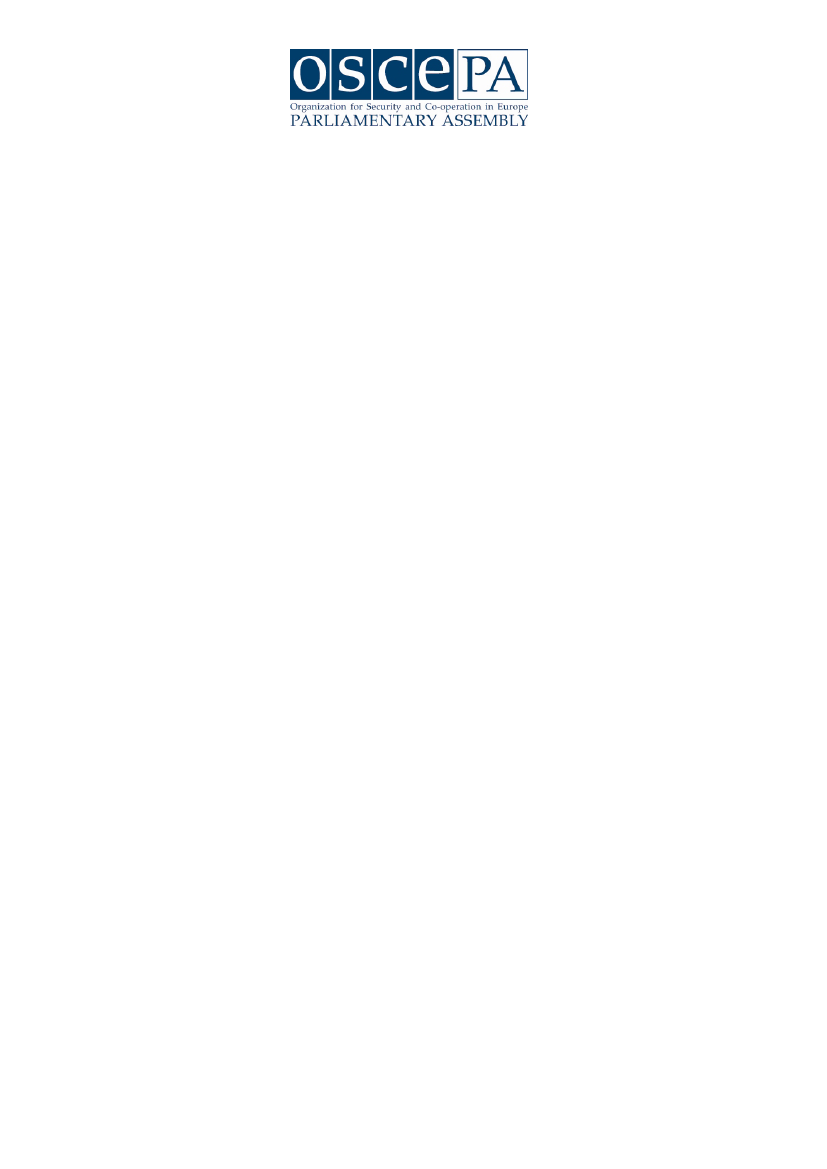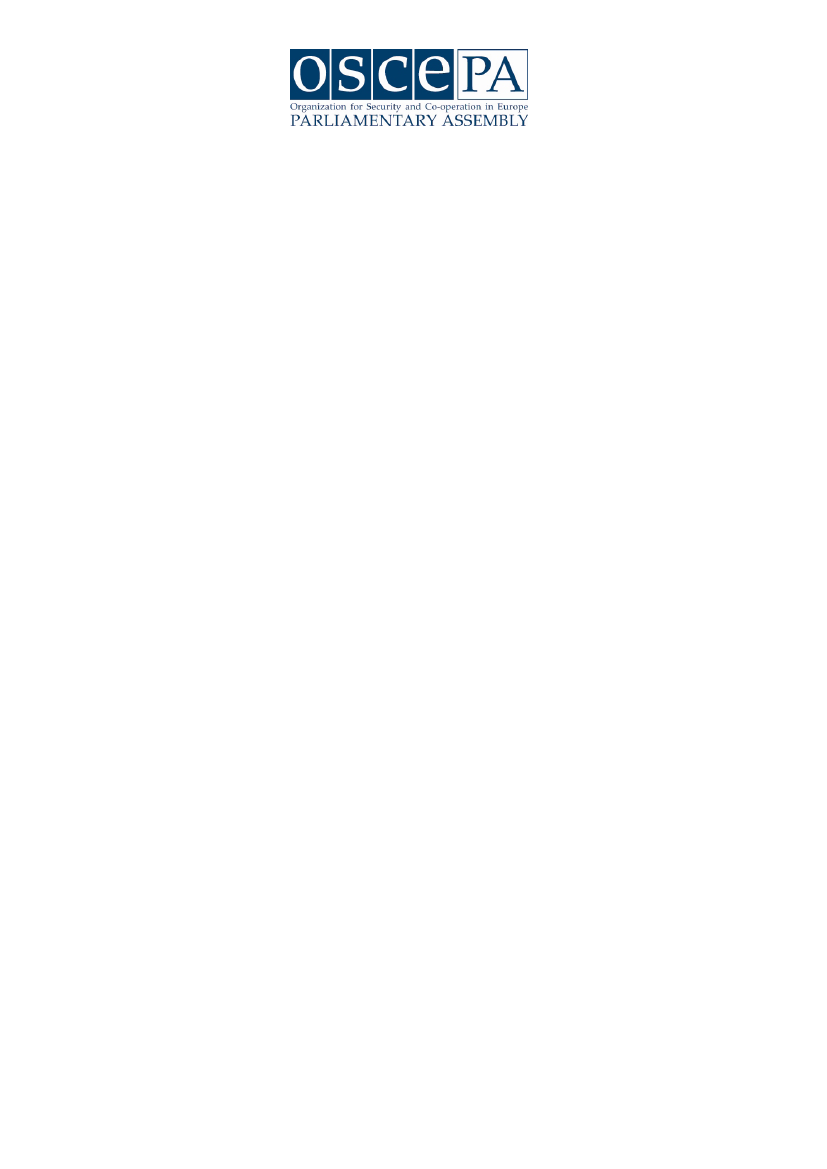OSCEs Parlamentariske Forsamling 2012-13
OSCE Alm.del Bilag 23
Offentligt
PA.GAL/3/1318 March 2013OSCE+ENGLISH onlyVienna Office
Statement by OSCE PA Special RepresentativeAmbassador Andreas Nothelle944thMEETING OF THE PERMANENT COUNCIL, 14 March 2013Let me start out by underlining what I have said here many times before: the PA attaches greatimportance to the OSCE’s work in the Human Dimension, and in particular to an open and publicprocess of monitoring the implementation of OSCE commitments in all 57 participating States –without bias, but in a manner that is open and candid enough to be congruent with soliddemocratic principles of governance.In democratic systems, parliaments are the central place where open debates take place andgovernments have to justify what they are doing. Transparency is a cornerstone of effectiveparliamentary governance. Multilateral diplomacy must not contribute to a further erosion ofparliamentary oversight. In the absence of a strong democratic dimension in multi-lateralorganizations, national parliamentarians who provide the organization with the money of thetaxpayers need to be fully informed about the work that government representatives often conductbehind closed doors. This is why the OSCE PA is so important for the transparency andaccountability of the organization. The PA will continue its calls on the OSCE in all its parts tobecome more transparent.Autonomous institutions funded by governments and not even indirectly accountable to thecitizens for the substance of their work remain part of the executive branch of government. Theycan serve a useful purpose by lending technical and expert assistance to legitimate democraticinstitutions. That way they help decision-makers to take the right decisions. However, they cannotsubstitute parliamentary scrutiny over the performance and the actions of the governments ofparticipating States.Much of the ODIHR report is about finances and resources of the OSCE or the lack of it. The longlist of conferences and seminars that the report mentions and the many documents and brochuresthat have been produced by the ODIHR cannot conceal that there is an apparent discrepancybetween the expectations that some have regarding the Office’s output and the amount of fundsthat it has at its disposal. Some years ago, our late former colleague Tabibian said here in thisPermanent Council: One of the problems of this multi-lateral organization is that those whomanage its work are the same ones who also ensure the money flow and assess the organization’sperformance. The amount of funds that executive structures receive and spend on hiredconsultants more often is the result of diplomatic negotiations than based on consequences drawnfrom an open debate about independent performance assessments.In this context, one of the recurring recommendations of our Assembly has been that the audit ofthe OSCE needs to be performed by independent professional outside auditors. You might haveseen the proposal made by the OSCE’s Special Representative on the OSCE budget, our Icelandicmember Petur Blöndal. We circulated it last week among the members of the ACMF. Mr.Blöndal’s proposal goes a step further by recommending that the PA be the place where the AuditReports are discussed.
The ODIHR report mentions several areas in which the Office cooperated with the PA during thereporting period. As I said a minute ago, ODIHR’s consultants can in fact, upon request by thedirectly elected legitimate representatives of our citizens, provide supplementary technicalexpertise and assist them in the exercise of their democratic functions.Somehow surprisingly, however, the written remarks that were circulated do not mention electionobservation as an area of cooperation in 2012. Throughout the reporting period, the PA has beenvery active conducting a high number of election observation missions. In 2012 and at thebeginning of this year we observed 11 elections with a total of 553 PA observers. Only three ofthese observations we did on our own. In all of the six full EOMs that the ODIHR-Report ismentioning, we cooperated with the Office, and our Special Coordinators led the short term OSCEobserver missions.We heard that the ODIHR - despite the six-and-a-half million Euros from the Unified Budget thatit has at its disposal for election observation - is facing difficulties when trying to meet theexpectations of all participating States of the OSCE regarding credible election observations, notleast because of decreasing numbers of secondments or reluctance by certain participating Statesto send observers to so-called “established democracies”. The PA budget for EOMs is a smallfraction of the ODIHR’s; the totality of our observations costs the PA less than an individualODIHR EOM. Despite this, or probably because of this and because of the problems that theODIHR report mentions, the PA’s role in election observation seems to be more crucial than ever.Of course we all know that this is an area where PA-ODIHR cooperation has often been difficult.Ideally, ODIHR-PA cooperation should take place between the two administrations of the twoinstitutions, in an effort to support the politician who is appointed as Special Coordinator in orderto help him deliver his mandate - the Post-Election Statement - in the best possible manner. Iprobably need to repeat this, although I have said it before: we are ready to cooperate with theODIHR, and we have been the strongest advocates of a full compliance with the 1997 CooperationAgreement in letter and in spirit. This is why we welcomed very much the 2006 Brussels MCDecision that called on the ODIHR to base our cooperation on this Agreement. For 15 years, thePA has implemented the Agreement in full.However, in December last year in Dublin, our Bureau members concluded that the ODIHR hasfailed to implement the Agreement by – among other things - not accepting the political leadershipof the Chairman-in-Office appointed Special Coordinator. PA President Migliori has thereforedeclared the Agreement inoperable. Again: This is not equivalent to not cooperating with theoffice.The PA’s committee in charge of the relationship between the PA and the executive side of theOSCE is the Ad hoc Committee on Transparency and Accountability, a committee of severalexperienced senior PA members chaired by President-appointed Belgian MP de Donnea. ThePresident has tasked this committee with exploring ways in which a cooperation that respectscentral elements of the Cooperation Agreement can be re-established. The next meeting of theCommittee will take place in four weeks from now, on April 14, before our Bureau Meeting. Ourcooperation with the ODIHR will be discussed there, as well as our Contribution to theHelsinki+40 Process and Mr. Blöndal’s Auditing proposal.


